At 92-years-old, Beryl Austin expected to be living in a nice retirement home with clean rooms and freshly washed sheets as she watched re-runs of the Matlock show; never did she imagine she would be fetching buckets of water from a faeces-surrounded pipe to flush a dirty out-of-order toilet.
Austin is a resident at the Chase’s Indigent Home on Robb Street, Georgetown. She has spent the last 20 years living in a small room with a single bed under a leaky roof. Her view of the city is the brick wall of a newly constructed retail store, and Styrofoam boxes floating in gutter water and vagrants’ faeces.
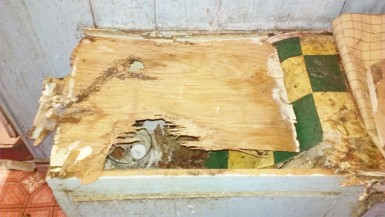
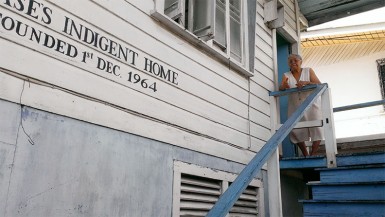
Whenever she opens her room door, she would tread lightly on rotten floor boards, blackened with dirt— not that her footsteps would disturb the other resident though, since most of them are over 70 years-old and suffering from hearing loss.
The number of residents has decreased to four over the past few years; at one time there were over 15 senior women living in the home. At one time, the Home was a refuge for destitute elderly women with no place to live or food to eat; now it barely shelters them from the rain.
The entire ceiling of the two-storey wooden building is leaking, most sections rotten with years of neglect. The building has eight rooms on the top flat, with a chapel and a kitchen. There are also two bathrooms—one abandoned while the other has no running water. The bottom flat of the building is deserted; there are bars on an inside step, blocking the path to the downstairs.
Austin stated that the building, which once had a management committee, has been neglected for over seven years. She added that there have been no repairs on the Home since the early 2000s. Austin added that the children of the deceased owner of the Home have decided to sell the building.
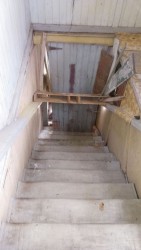
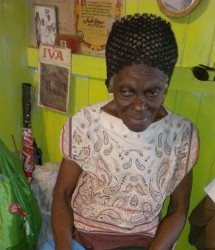
She recalled that Chase’s Indigent Home had a committee that used to look after the interest of the building and its residents. The committee, she said, used to clean the building and provide hot meals and rations for them. But after a while, the children of the owner of the building removed the committee and took full control of the retirement home.
She said the residents were then required to pay $3,000 from their pensions for electricity. There was no agreement about food, security and maintenance of the building. Then as the years went by, the building started to deteriorate, locks were stolen, market vendors, who vended in front of the Home, would stack their moveable stalls in the passageway of the building and litter the yard.
Now, the building is littered with garbage and serves as an outdoor loo for vagrants and market people.
“We can’t do anything better. Most of us can’t do a lot of work so we depend on people to help us. But it’s expensive to find $30,000 every month to pay a rent from our measly pension,” Austin said, lamenting that private retirement homes were too expensive to afford.
She stated that the building was not even secure; she said there was no lock for the gate or the front door of the building. “This place is abandoned. Nobody is looking it after and we can’t do anything either because we are all elderly people.
She noted that the walls of the building were falling apart with decay and the windows were not even opening “so we could get some fresh air”. She stated that as soon as they opened their front door, they would be greeted by the noises from the Bourda market.
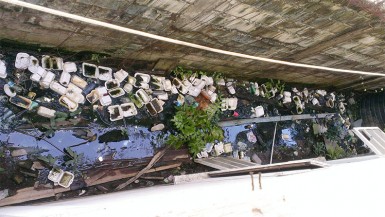
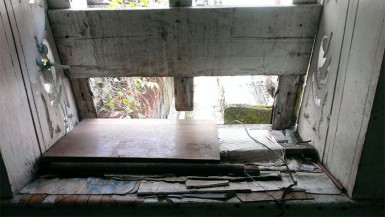
Avril Gordon, 78, has been living at the Chase’s Indigent Home since 2006. Austin was the person to offer her shelter at the Home and when she arrived she was placed to live in a room at the back of the building. She said she had to buy a canvas to cover the ceiling in her room because rain would seep through the holes in the roof and wet her bed.
She has since moved from that room to one of the rooms near the kitchen. But the problem is the same: she has to cover parts of her room with cardboard and plastic to prevent the rain from getting in.
“It’s a shelter and God bless it. All I can do is cope and try to make it livable because complaining gets us nowhere. These people don’t want to fix anything here. So we don’t tell anything anymore because they have eyes and they can see for themselves how we living,” Gordon said.
She stated that the women in the shelter could not afford to pay rent at a private home so the small fee for electricity is good. However, she said the caretakers of the building “were only promising and promising that they would fix things but we know promise is a comfort to a fool”.
She said since she arrived at the building in 2006, the toilet had not been flushing and they would have to fetch water from downstairs, which is a hard task since piles of moveable stalls would be packed in the yard.
“But I’m thankful though, it’s not like I could afford better. This is a shelter to keep the rain off my back even if it leaking on my bed,” she remarked.
According to the National Development Strategy 2001-2010 chapter 26, many elderly people are vulnerable and living below the poverty line, especially those surviving on small pensions. It stated that “no special provisions are made either by the Government or the private sector to enable them to live in a modicum of comfort.”
It highlighted that their nutrition is poor and health services available to them are inadequate, while private housing facilities are dilapidated and unmaintained.
Gordon stated that there was no recreation for them or “breathing space” to relax. She said they are, technically, confined to the inside of the building. “There is no air or breeze. We can’t even look through the windows. Some of the windows can’t even open up,” she said, adding that all the caretakers of the building do is collect money at the end of the month.
The National Development Strategy stated that many elderly people live alone and are often faced with loneliness. It stated that there is a dearth of facilities which could provide them with opportunities for recreation and social interaction.
“In sum, the elderly in Guyana do not constitute a constituency whose needs are addressed. They are not organised in their own interests, not even to the limited degree that other vulnerable groups are,” the strategy said, indicating that there is no law in Guyana which advises that certain types of physical facilities be laid down in public places for the elderly and that buildings be designed to avoid inhibiting their mobility.
“They are not concerned about us,” resident Ann Vieira lamented, stating that whenever they tried to speak with the children of the deceased owner they would be “pushed aside”.
“They would tell us ‘I don’t want to hear anything about Chase’s Home’ and that would be the end of it. Things were different when we had a committee,” she said.
Chase’s Indigent Home was established in December 1964 for destitute elderly women who had no place to sleep, money or food. The building, in the past, had attracted many elderly women but of recent there has been no new resident.





